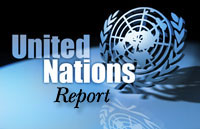
UNITED NATIONS (FinalCall.com) – The new United Nations Human Rights Council at their first meeting in Geneva, June 19-30, adopted the UN Declaration on the Rights of Indigenous Peoples, which seeks to reaffirm the right of self-determination of Indigenous peoples and identifies their rights.
These rights include, among others: the right to protection against actions taken without free, prior and informed consent; the right to be consulted on decisions and actions that have an impact on Indigenous peoples’ rights and interests; the right to traditional lands and resources; and the right of Indigenous peoples to maintain and continue to develop their own spiritual and religious practices.
According to UN documents, the declaration was passed with a 30-2 vote, with Canada and the Russian Federation voting against. There were 12 absentions and three nations were absent–Djibouti, Gabon and Mali.
It will be forwarded to the General Assembly for adoption.
Alberto Salvamendo, general counsel for the San Francisco-based International Treaty Council, says that the declaration “is a good thing.”
“This process has been going on since 1992. We have been steadfast in our determination to see that a document that we agreed upon would be put before the General Assembly,” Mr. Salvamendo said.
Paul Meyer, representing Canada, in an explanation of his vote, said his nation had “difficulties with a process where all parties had not discussed proposed language on several key issues.”
In a July 11 story, Reuters said that the Canadian representative believed that the declaration would have “no legal effect.” According to the wire story, Canada “argued that several of the articles would violate the national constitution.”
Alexey Akzigitov, representing the Russian Federation, in an explanation of his “no” vote, said the declaration did not “enjoy genuine consensus.” He said, in this context, “Russia could not support the draft declaration in this form.”
Nations from Latin America hailed the vote as a major achievement. “We have finally closed the circle,” commented Xochiti Galvez of Mexico. “We are at an historic point in time, finally acknowledging the fundamental rights of the world’s Indigenous peoples,” the Mexican representative added.
“The repeated demands for the distinction of the distinct status of the Indigenous peoples has at last been addressed,” noted Indigenous Peoples Caucus member Adele Wildschut. “The true legacy of the declaration would be the way in which the lives of the Indigenous peoples would be affected on a daily basis. It is the implementation of the decision at the community level which will have the greatest impact,” the caucus representative insisted.
The representatives from Germany and the United Kingdom stressed that the declaration was “not legally binding.”
“The United Kingdom supports the provisions of the declaration that recognizes the rights of Indigenous peoples under international law, on an equal footing with all,” stated Nicholas Thorne of the UK.
Andreas Pfaffernoschke, of Germany, said the right of self-determination of Indigenous peoples could not “influence the territorial integrity of the state.”
Mr. Salvamendo argues that the declaration sets moral and ethical standards that states have to follow. “It is important to know that Indigenous peoples have a right to say no to the transnational corporations that want to control the resources on their lands,” he said.
Indigenous analysts have said that there is opposition from those nations that want to continue their control over resources such as oil, gas and timber on Indigenous peoples’ land.












